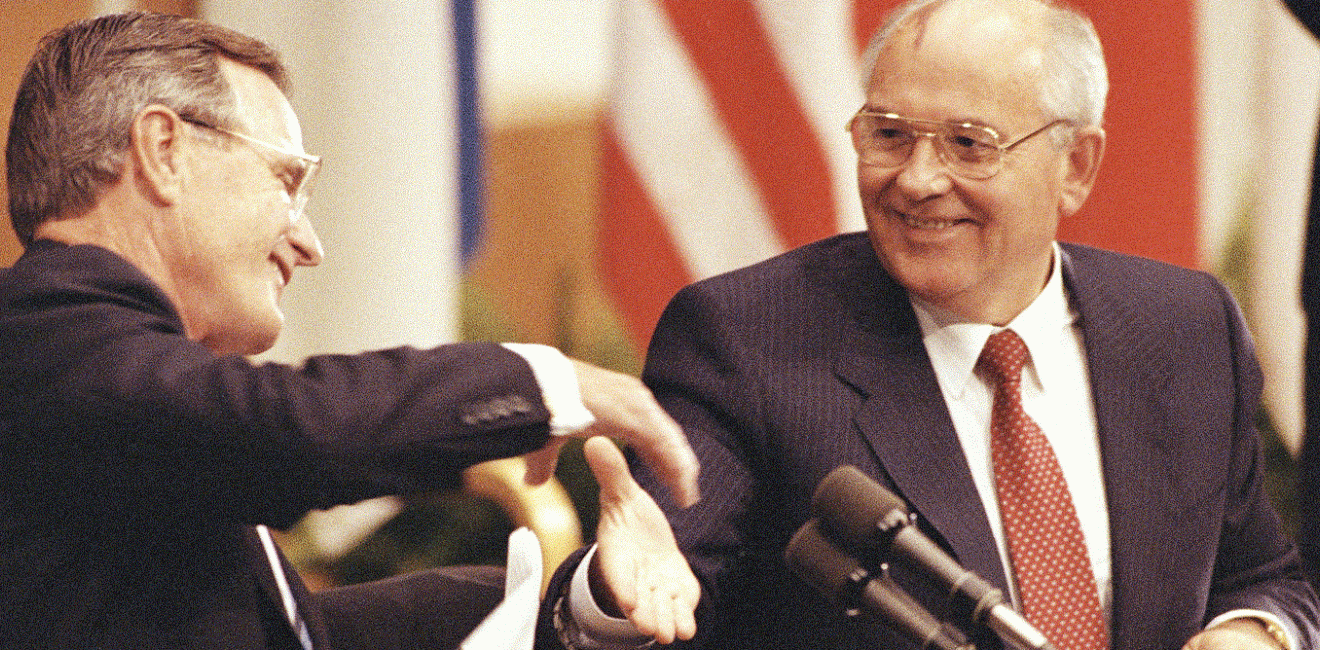In early September 1990, George H.W. Bush and Mikhail Gorbachev met in Helsinki. There was much on their respective plates: Saddam Hussein’s invasion of Kuwait, the prospect of German unification, and the perennial challenges of arms control. Like this July’s summit meeting in Helsinki, both men sought to renew a spirit of collaboration.
Helsinki, the capital of neutral Finland, offered to host the meeting without the need for much pomp and circumstance. Hosts who do not insist on reviewing their national guard and standing straight to national anthems are rare. In both instances, the Finnish president offered his palace and got out of the way – a governing style that few can emulate.
Addressing the international press at a Moscow airport lounge in August 1990, the Soviet foreign minister had agreed with his American counterpart to sign a joint statement condemning Saddam’s invasion of Kuwait. For Secretary of State James A.Baker III, this marked the end of the Cold War. With Gorbachev’s acquiescence, Foreign Minister Eduard Shevardnadze had abandoned the Soviet protege in Iraq to gain improved relations with the United States. The reduction in bilateral tensions allowed for slower Soviet defense spending and greater focus on reforming the centralized economy. Perhaps the U.S. might assist in that reform? To demonstrate good will, U.S. Commerce Secretary Bob Mosbacher would lead a delegation of U.S. business leaders to Russia the very next day to explore investment opportunities.
To repel Saddam from Kuwait, they would need to act together in the UN Security Council. Gorbachev asked for something in return: joint chairmanship of a Middle East peace conference. This was an anathema to the Israelis, and Bush interpreted the Soviet request as ‘We leave the Middle East by abandoning Saddam Hussein, but return through co-chairmanship of an Arab/Israeli peace conference.’ Bush handed to Baker, then called ‘my lawyer,’ the task of unravelling that knot.
On arms control, both presidents agreed to pursue with greater vigor the Conventional Forces in Europe agreement (CFE) and accelerate the Strategic Treaty on Arms Reduction (START), then bogged down in complex details. They committed to sign the START treaty in early 1991 and implemented that promise in London on July 31 that year.
A presidential press conference and a joint statement followed. They had addressed a limited agenda and gained commitments to push hard for Iraqi withdrawal from Kuwait, focus on CFE, accelerate START negotiations, and pursue commercial opportunities. Afterwards, Baker headed to Brussels to brief NATO allies on the summit meeting. Bush headed home to prepare for an address to Congress. Back home, the president encountered minimum interest, with scarcely a headline about his meeting with Gorbachev.
This quiet, business-like meeting contrasts starkly with Donald Trump’s July 2018 meeting with Vladimir Putin. First, it followed on the heels of heated discussions between the U.S. president and European allies at the NATO summit. Fear existed that Trump might concede to Russia’s annexation of Crimea and occupation of the Donbass. He might reduce U.S. troop commitment in the Baltics. Knowing that Trump was scheduled to meet one-on-one with Putin, NATO leaders were anxious about the content of this tete-a-tete exchange. Secretary of State Pompeo did not head to Brussels to brief NATO allies, leaving them to rely on Russian reports of the meeting.
Second, less than a week before Trump left Washington, the U.S. Justice Department had handed down criminal indictments on 12 Russian military personnel for interfering in the 2016 presidential elections. U.S. prosecutors had filled Trump’s brief case with granite to enable him to make a credible case of Russian meddling. This should strengthen Trump’s negotiating stand and gain, if not the presence of the 12 in US.. courts, a firm commitment by Purin to desist from future “active measures” of this kind.
The ensuing 45-minute press conference was not the staid production of September 1990’s accord on a joint statement, but a one-sided presentation by Putin of agreements reached on Syria, counterterrorism, and cyber security. The U.S. president was left to answer critical domestic political questions and failed to address the heart of the summit, namely, Syria. The Russian press concluded that the meeting was a great success. The U.S. press and NATO allies rejected that conclusion, concerned by the president’s willingness to accept Putin’s word on election interference. Those same allies found a one-sided match, not mutual cooperation, to solve global problems. It was left to Helsinki’s host, President Sauli Niinisto of Finland, to conclude with relief that Trump had not weakened NATO’s stand on Crimea and the Donbass.
Maybe social media has changed the manner in which world leaders communicate with a global audience, turning substantive messages of cooperation into trysts for prime time? But management of global security by the world’s major nuclear powers deserves serious and substantive discussion, even if some may consider that dull.







